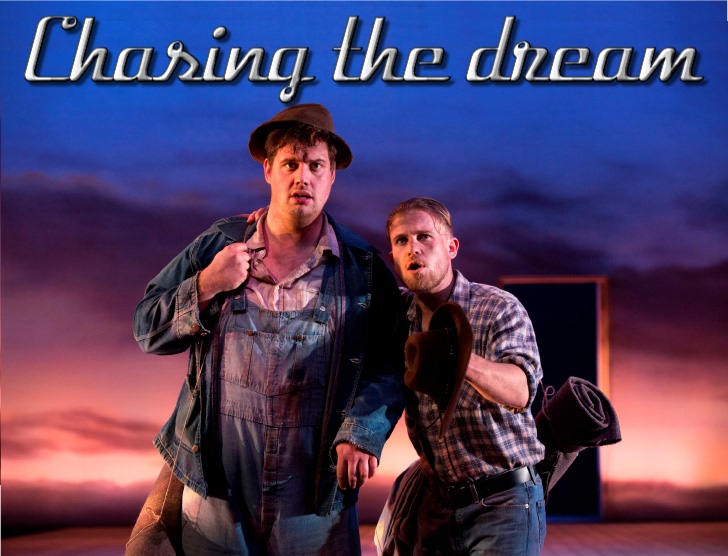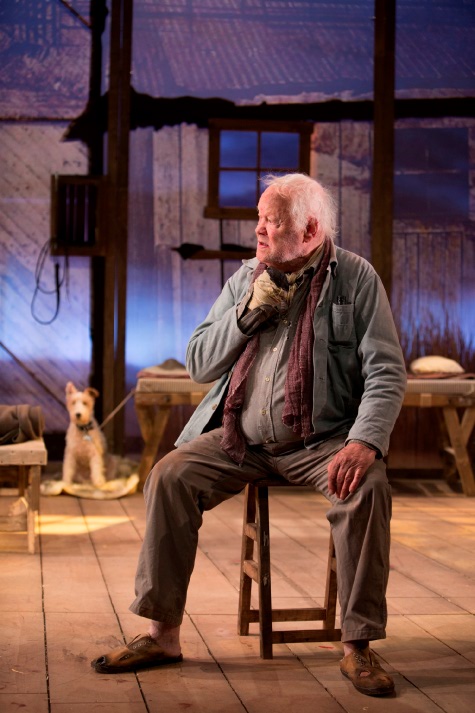|

Kristian Phillips as
Lennie and William Rodell as George. Pictures:
Ellie Kurttz
Of Mice and Men
Birmingham Rep
****
STEINBECK is famous for creating
gloriously deep and fascinating characters and challenging ideals.
During the great depression, the American dream
was still prevalent and in his 1937 novel, at the heart of the financial
travesty, the American dream was stronger than ever for George and
Lenny.
Their dream, much like everyone else’s, is to get
enough money to buy their own patch of land so they can stop working on
other people’s farms and be their own boss.
The translation from page to stage was executed
so well that it was hard to think that the original text was not a
script in the first place.
Director Roxanna Silbert, the Rep’s artistic
director, brilliantly captured the essence of the struggle of work and
money. With Liz Ascroft’s rural and woody set design, Steinbeck’s bleak
description of time and place was effortlessly visualised
Interestingly, the wings are stripped back for
the audience to see the cast always in the background, creating the
effects of music and sound that Steinbeck is famous for describing. It
is an interesting concept, showing that all have their place to create a
workforce of their own.
Steinbeck warns us that all dreams are hard to
come by and that people are there to challenge what we want. Lennie,
although big in stature, has the mind of a child.
 The
audience can see that Lennie’s heart is as big as his body. He wants to
pet the things he is drawn towards, like a mouse or small puppy. The
audience can see that Lennie’s heart is as big as his body. He wants to
pet the things he is drawn towards, like a mouse or small puppy.
He is played by the wonderful Kristian Phillips
and his delivery of the child-like nature of the character only adds to
the gut-wrenching tragedy we witness at the climax of the play, driven
by ignorance and awful luck.
Phillips shows Lennie’s innocence and his
fascination with textures and ‘pretty things’, although the reason they
find themselves having to beg for new work is because of his fascination
for a pretty woman’s hair.
It is not his fault that we witness tragedy at
the end of the play, but in other ways it is. In a gripping scene with
Curly’s wife, played by Saoirse-Monica Jackson, it is inevitable that
the story must end in the way it does.
Dudley Sutton as Curly with Arthur in the backround
George acts as Lennie’s guardian, doing all that
a father would do. When conflicts ensue on the farm, George is the first
to defend Lennie. At the start of the play, George explains how better
life would be without having to look after him, but his hypothetical
blasts of anger are soon to be reality.
William Rodell takes control of the streetwise
George with a courageous charm. He is strong in every way and is the
source of the emotional tragedy we feel at the end. Rodell carries the
story effortlessly and the role is a testament to Steinbeck’s profound
characterisation
This story is about the futility of the American
Dream. Most have given up on their hopes and find it absurd that Lennie
and George still have theirs. Silbert makes sure to highlight each and
every character’s story, staying close to Steinbeck’s political thoughts
of the time.
Candy, played by Dudley Sutton, (Charlie in
Lovejoy) is an old farm worker and only has his dog, played by Arthur,
who’s owned by the Rep’s theatre manager, as his only solace. One of the
most touching moments was when the dog had to be shot, because of his
age.
When the audience hear the fateful shot, Sutton,
without saying a word, turned over on his bed and simply put a hand over
his face. The audience were touched by his understated, and yet greatly
effective delivery at the moment of loss. Another great performance was
shown in Jonah Russell’s portrayal of the understanding manager, Slim.
The story is powerful, completely shocking and
above all, gut-wrenchingly tragic. Silbert’s commentary on Steinbeck’s
novel is the reason why this is the play’s second run at the Rep. Filled
with irony and sadness, the story makes us think about the horrors of
humanity, and allows us to be thankful for how much society has
developed since Steinbeck first introduced George and Lenny to the
world. To 13-02-16.
Elizabeth Halpin
09-02-16
After the Rep Of Mice
of Men goes on tour and visits
Wolverhampton Grand 8-12 March
|

